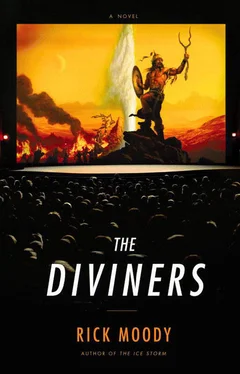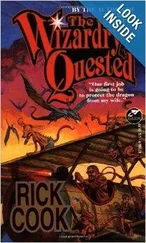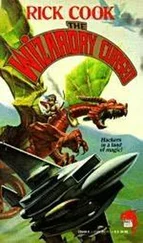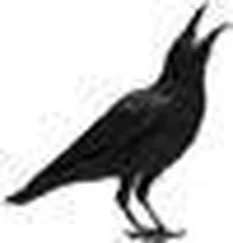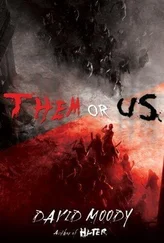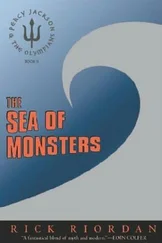“The Mongol hordes.”
Up the block, the wife of an absentminded professor closes her front door behind herself. A corgi leads her out. They head toward Washington Square Park.
“Driven off of the grassy plains for what reason? Driven out of their homeland of millennia for what reason? If it was so perfect there; if they could found a religion there, in a land of plenty, a culture of enlightenment that persists to the present day, why leave? Charles Ng will tell you. Drought. In those days there was a great drought in the East. The rivers dried up. Primitive efforts to irrigate had created salt deposits, rinds of salt, on the vast steppe. There was no snow in the mountains, and so the runoff of the snowcapped peaks that in spring and summer slaked the grasslands never came. The lakes were mud puddles, and Asian tigers lay in the tall grass waiting for any living thing. The way of life for the Mongolian nomads involved grave danger. These grasslands had sustained the yak, the lamb, the goat, the Asian antelope, and the brave clans who had dominion over them. These grasslands were home to great flocks of fowl and herds of game. And now these grasslands were burning in the massive fires of Mongol legend. There was no cheese, nor curds, nor yogurt, the provisions that had sustained those Mongol families around the campfire. There were no meats from domesticated animals that once had made the children strong. And the pelts that kept them warm during the bitter Mongolian winter? Charlie Ng has written a bunch of books about the decades of Mongol drought and he has written about the Mongolian rainmaker, Zoltan —”
“Are you joking? Zoltan?”
“We can work on the names later. You’ll see. Anyway, on the one side, the drought of the Mongolian plains. On the other side, the Roman Empire. The cradle of civilization, expanding northward with taxes, tributes, foreign tongues. It was a tinderbox, this historical moment, and Zoltan, peace lover, a man of shamanistic gods, it was he who renounced the plans of his second cousin Attila. Attila, who slaughtered Zoltan’s father in order to seize control of the nomadic clans, the very clans who now rally the Mongolian archers on their stallions, set the valleys of Mongolia aflame. It was a fire of such enormity that it made our southwestern wildfires look like a backyard barbecue. The riders, galloping down across the mountains and into the empire, were safe only because they were under Atilla’s control. Those who refused? They would be consumed by the fire. Get it? A valley of flames, two thousand years ago, and Attila is raping Roman women, burning villages. All the world is in flames, but Zoltan appears with the wall of flames behind him, and he’s walking through a valley in flames, in, in, I don’t know, in Uzbekistan, and he plucks up this forked stick, for this forked stick will be his crutch — I forgot this part — because he has a withered leg, and he says to his sidekick, the Moorish slave named Kiko, ‘This forked stick is the indication of the two paths down which we can journey, the path of good and the path of ill, and I, Zoltan, my family torn asunder by the Hun, resolve to use these two as one, the two — good and ill — make one, to forge our history, the result of which will be as water, from which all living things come. My name will be written in water, and down through all the ages there will be water for the descendants of Zoltan, until history rests from its labors, and my heirs will always know that the way of peace and magnanimity is the way of water.’ And from there Zoltan marches, alone, with forked stick and sidekick, into the ruins of what is now Europe.”
Thaddeus has long since plunged his gloved hand into the pocket of his black leather overcoat, though it looked splendid hovering at the door knocker on Washington Mews. He pauses for effect. And now he begins to walk up the street.
“So there’s no Charles Ng?” Annabel says. “No such person?”
“It’s a good name, though, right?”
The generations between Zoltan and his next important heir, Babu, are thirty generations, and the names are impossible to pronounce, and yet Thaddeus lists them while the two of them are walking down University. Here now is the multigenerational saga, with its epic sweep. Every twenty years, if not sooner, some cock finds a home in some pussy, and another infamous generation is spawned, and the peoples of Zoltan move back and forth across the borders, they’re ejected here, they turn up somewhere else, and in their sorrow and impermanence, they set their tents rocking, for no class of men and women has ever been more fertile than a refugee population. Thaddeus produces the flask from his coat, takes a long pull on it, hands it to Annabel, rhapsodizing. Here they are, before CBGB’s, where once hordes of rock-and-roll musicians gathered in leather jackets and torn jeans, feather boas and fishnets, where once there were Mohawks, body piercings, tattoos. They stand before it, Bowery and Bleecker, while kids spill in and out of the doorway. One youngster with bright blue hair remarks, “Hey, you’re, you’re, you’re. .”
Thaddeus raises high his hands to put a stop to the interruption.
“Listen close.” He pauses for effect. “The two most hated groups of people in all Europe were the Gypsies and the Jews. Everywhere you went, the persecution of the Gypsies and the Jews. The Gypsies walked all the way from India, across a continent, with their inscrutable language, and when they met up with the Magyars, well, they were in the country of nomads. And that’s where the heirs of Zoltan, the first-ever diviner, intermingled with the Gypsies and produced the great, unbroken string of Gypsy diviners. These guys could find a spring at a hundred yards. It was through them that the Gypsy families of Hungary thrived. They’d go into town, dragoon a few Saxons and a few Slavs, whom the Gypsies believed were the best traders. A shiv at the throat. Separating Saxons from their purses, this was the best activity of all. The Gypsies thrived, and their leader, Andrós, decreed that no more magic was to be practiced publicly by the Gypsies of Hungary. They confined themselves to stealing loot from Jewish shopkeepers.”
A small throng from the club gathers around, skeptically, but Thaddeus rises to the story, as he always does. He gives himself over entirely to charm and he smiles, and when he smiles, things happen, regardless of the existence or nonexistence of conviction.
“It was Babu, son of Andrós, a young guy who grew up straight and true, who noticed Nurit, the daughter of a jeweler, and thereby brought close these two reviled races of men. Her hair was as black as coal, and her skin was like ivory, and she was shy, with enormous brown eyes. And Babu was so bewitched by her that he was still lingering in the shop long after his fraternity of thieves had run off with a brace of necklaces. So it’s Babu, the Gypsy at hand, who is set upon by a gang of Jewish shopkeepers. They tie him up and carry him back to the neighborhood where they live. And they threaten to cut off his fingers one by one unless he is willing to tell them where they can find the other thieves.
“You know what happens next, right? It’s what always happens next in Europe. A gang of men with staves and torches appears to drive the Jews out of the town and into the countryside. No time to dispense with Babu’s fingers, and his protestations that he’s a Gypsy, not a Jew, don’t impress the Magyars, who are the ones driving out the Jews. If there’s a Gypsy in the bunch, from their point of view, no matter. And just as Babu’s fingers aren’t detached from him, neither is Nurit, the hottie, the love interest, detached from him, and during the march out of the city and into arid fields, the two of them manage to have a few wanton kisses, and Babu caresses her bosom. That’s about the best he can do at the moment, and it seems amazing, the softness of her bosom, at least until they are in the scrub brush that is no man’s property at the end of that country. The elders among the Jewish men — dry-eyed and fatalistic — hold council and decide that it was Babu who led the Magyars to them. They decide that they have no choice but to kill him. There’s no other way to deal with it, even when Nurit pleads: ‘You can see from his eyes that his heart is true! He stole nothing from the shop!’ Her father tells her she’s an ignorant girl, ignorant in the ways of the world. The Jews have nothing but enemies and they are driven from one place to another, always dispossessed, and she says, ‘No! Babu loves me.’ And that’s when Babu tries his own way out of his bad spot. He boasts that he can find water for the families of this diaspora. He says, ‘Do not your families need water? Do not they need to drink? My people have supplied water from time immemorial. A little gold is nothing. The true coin of the realm is water. I’m a diviner and I can give you what you need.’”
Читать дальше
